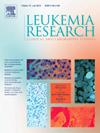慢性粒细胞白血病患者既往使用酪氨酸激酶抑制剂后用阿西米尼治疗。
IF 2.2
4区 医学
Q3 HEMATOLOGY
引用次数: 0
摘要
背景:在慢性粒细胞白血病(CML-CP)中,由于不耐受或耐药而切换酪氨酸激酶抑制剂(TKI)治疗是常见的。阿西米尼是一种针对ABL肉豆醇口袋的ABL/BCR::ABL1 TKI,可改善耐受性和疗效,但实际疗效数据有限,特别是在既往有过TKI治疗的患者中。患者和方法:一项回顾性的,美国医师小组为基础的图表回顾研究进行了成人CML-CP患者无T315I治疗阿西米尼之前的TKI。使用Kaplan-Meier分析评估治疗时间、达到或维持MR2 (BCR::ABL1 ≤1 %)、MMR (BCR::ABL1 ≤0.1 %)和DMR (BCR::ABL1 ≤0.01 %)的时间。在因不耐受或耐药而首次停用TKI的患者中进行亚组分析,并将第一代或第二代TKI作为首次TKI。结果:共纳入255例患者(中位年龄62岁,56.5 %为男性)。伊马替尼(49.8% %)、达沙替尼(34.5% %)、尼罗替尼(10.6% %)和博舒替尼(5.1% %)作为第一次TKI。首次TKIs耐受和耐药分别为43.5% %和23.5% %的患者。在48周post-asciminib启动,95.0 %的患者(95 % CI: 91.3 %,97.1 %)仍然在asciminib, 84.0 %(95 % CI: 78.6 %,88.6 %)实现或维护MR2, 68.3 %(95 % CI: 61.8 %,74.5 %)MMR,和40.6 %(95 % CI: 34.2 %,47.8 %)DMR。结论:总体而言,大多数患者继续接受治疗并达到或维持MMR,表明阿西米尼耐受性良好且有效。亚组之间的结果一致,表明阿西米尼对于患者是一种有效的选择,无论之前是否使用过TKI,包括那些对第一次TKI不耐受或耐药的患者。微摘要:关于阿西米尼在既往使用酪氨酸激酶抑制剂(TKI)治疗慢性粒细胞白血病(CML-CP)后的有效性的实际数据有限。在这项基于美国医师小组的图表回顾中,几乎所有患者(95% %)仍在使用阿西米尼,68 %的患者在48周时达到或维持了主要的分子反应,这表明阿西米尼在一次TKI后具有良好的耐受性和有效性。本文章由计算机程序翻译,如有差异,请以英文原文为准。
Treatment with asciminib after a prior tyrosine kinase inhibitor in patients with chronic-phase chronic myeloid leukemia
Background
In chronic-phase chronic myeloid leukemia (CML-CP), switching tyrosine kinase inhibitor (TKI) therapy due to intolerance or resistance is common. While asciminib, an ABL/BCR::ABL1 TKI targeting the ABL myristoyl pocket, offers improved tolerability and efficacy, there is limited real-world effectiveness data, particularly among patients with treatment with one prior TKI.
Patients and methods
A retrospective, US physician panel-based chart review study was conducted on adult patients with CML-CP without T315I treated with asciminib after one prior TKI. Time-on-treatment, and time-to achieving or maintaining MR2 (BCR::ABL1 ≤ 1 %), MMR (BCR::ABL1 ≤ 0.1 %) and DMR (BCR::ABL1 ≤ 0.01 %) were assessed using Kaplan-Meier analyses. Subgroup analyses were performed among patients with first TKI discontinuation due to intolerance or resistance, and by first- or second-generation TKI as first TKI.
Results
Overall, 255 patients (median age 62 years, 56.5 % male) were included. Imatinib (49.8 %), dasatinib (34.5 %), nilotinib (10.6 %), and bosutinib (5.1 %) were received as first TKI. Intolerance and resistance to first TKIs were reported for 43.5 % and 23.5 % of patients, respectively. At 48-weeks post-asciminib initiation, 95.0 % of patients (95 % CI: 91.3 %, 97.1 %) remained on asciminib, 84.0 % (95 % CI: 78.6 %, 88.6 %) achieved or maintained MR2, 68.3 % (95 % CI: 61.8 %, 74.5 %) MMR, and 40.6 % (95 % CI: 34.2 %, 47.8 %) DMR.
Conclusions
Overall, most patients remained on treatment and achieved or maintained MMR, suggesting that asciminib was well-tolerated and effective. Results were consistent among subgroups, indicating that asciminib is an effective option for patients regardless of prior TKI used, and including those intolerant or resistant to their first TKI.
Micro-abstract
There is limited real-world data regarding the effectiveness of asciminib after one prior tyrosine kinase inhibitor (TKI) in chronic-phase chronic myeloid leukemia (CML-CP). In this US physician panel-based chart review, nearly all patients (95 %) remained on asciminib and 68 % achieved or maintained a major molecular response at 48 weeks, suggesting that asciminib is well-tolerated and effective after one prior TKI.
求助全文
通过发布文献求助,成功后即可免费获取论文全文。
去求助
来源期刊

Leukemia research
医学-血液学
CiteScore
4.00
自引率
3.70%
发文量
259
审稿时长
1 months
期刊介绍:
Leukemia Research an international journal which brings comprehensive and current information to all health care professionals involved in basic and applied clinical research in hematological malignancies. The editors encourage the submission of articles relevant to hematological malignancies. The Journal scope includes reporting studies of cellular and molecular biology, genetics, immunology, epidemiology, clinical evaluation, and therapy of these diseases.
 求助内容:
求助内容: 应助结果提醒方式:
应助结果提醒方式:


